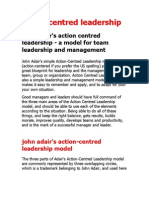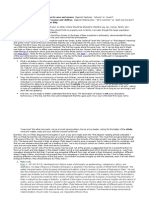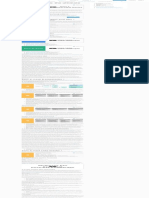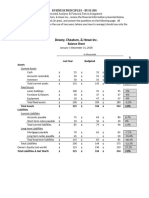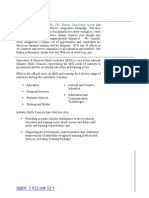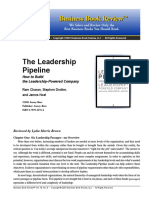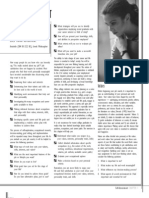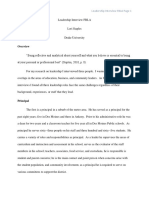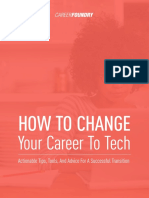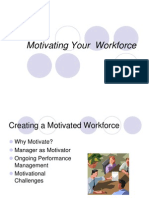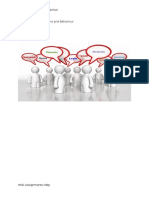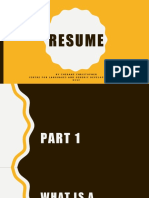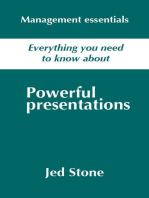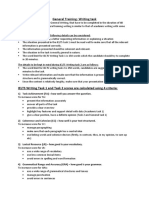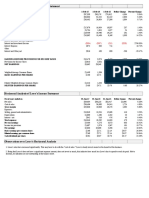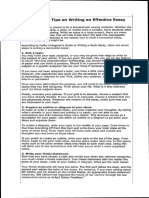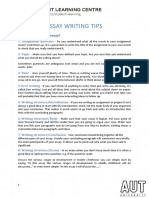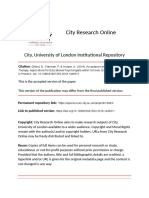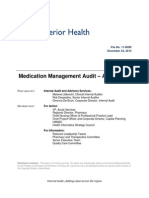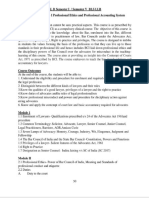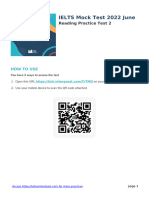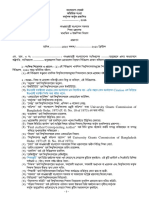Job Interviews Yspace
Job Interviews Yspace
Uploaded by
Alison JcCopyright:
Available Formats
Job Interviews Yspace
Job Interviews Yspace
Uploaded by
Alison JcOriginal Description:
Copyright
Available Formats
Share this document
Did you find this document useful?
Is this content inappropriate?
Copyright:
Available Formats
Job Interviews Yspace
Job Interviews Yspace
Uploaded by
Alison JcCopyright:
Available Formats
JOB
INTERVIEWS
JULY 2014 Page 1
PREPARATION FOR JOB INTERVIEW
Once the interview has been arranged, you should know:
• The date and time and where the interview will take place, how you will get there
and check times of trains and buses, also the cost.
• Name of person you will be seeing at the interview.
• Research the company website and look into what the company does and what they
look for in their employees.
How to shine at interview
• Greet the interviewer with a firm handshake, sit up straight and don’t fidget
• Read your CV beforehand so you can refer to it
• Appearance is important, dress smartly do not wear jeans or trainers. Cover up any
tattoos on show.
• Look bright and attentive and speak clearly and confidently, be positive about
yourself and your experiences.
• Take your time to think before answering questions.
• Turn your mobile phone off during the interview.
What Not To Do
• Don’t be late
• Don’t swear or use slang words
• Don’t smoke just before the interview
• Don’t lie: the interviewer may see through you. Even if you get the job, your
employer can dismiss you if they find out that you have not been honest
• Don’t criticise former employers or colleagues. Interviewers may mark you down as
a troublemaker and a gossip.
Personal Safety
• Make sure the interview is being held at the company premises or another public
place such as a cafe.
• Tell someone where you are going and what time you expect to be back.
• Do not let your interviewer drive you home.
JULY 2014 Page 2
TOP 10 INTERVIEW QUESTIONS
Typical questions an interviewer might ask you:
You’re Skills - What are your strengths and weaknesses?
• What can you do for us that other candidates can’t?
• What would your colleagues and friends consider as your best qualities?
• Why should we employ you?
What the interviewer really wants to know: can you do the job?
Know your strengths and mention ones that are related to the job you are being interviewed for. It
is important to give examples of when you use the skills. Typical strengths employers look for are:
• Communication – the ability to get on with a wide range of people
• Team working – the ability to be an effective team leader or member
• IT skills – most jobs these days need some IT skills
• Good attitude – hard worker, honest, polite, co-operative
• Problem solving – using your initiative to identify solutions
• Enthusiasm – employers like someone positive
• Quick learner – so you can take on new tasks
• Determination – shows you are focused on achieving goals
• Flexibility – doing a variety of tasks to achieve a common goal
If you are asked about weaknesses, don’t list too many – only mention one! Choose a flaw that isn’t
essential to the job. Turn it into a positive, such as how you’ve worked on your weakness. Or you
could present it as an opportunity for development.
Good answers:
• Strengths: I am a good organiser and I plan everything in detail. I showed this when I was
given a new project and I had to get it up and running from scratch
• Weaknesses: Sometimes I am too enthusiastic when working on a new project, but I have
learned to adjust to everyone else’s pace and not go charging ahead.
JULY 2014 Page 3
The Employer - Typical questions:
• Why do you want to work here?
• What do you know about the company?
• What can you do for us that someone else cannot?
What the interviewer really wants to know: Do you know what we do? Why have you chosen to
apply to this company?
Show your knowledge of the company by having facts and figures at the ready, such as:
• The size of the organisation, what product or service is given
• Latest developments in the field
• The history, goals, image and philosophy of the employer
Good answer:
• Smiths are a respected firm with a reputation for high quality and I’d like to be part of that
success. The quality of my work is important to me so I feel I’d be in the right place. I’ve also
heard you invest in your staff by training and developing them.
About the job – typical questions:
• What will the main tasks and responsibilities be in this job?
• What do you think the main challenges will be?
• What would you do in the first day/week/month/year
The interviewer wants to know if you fully understand what the job will involve. They want to know
why you think you’d be good at it and how you’d approach it if they offer you the job. To answer this
question well make sure you read the job description thoroughly and research how the organisation
operates.
Good answer:
• The main task is to supervise a team of sales staff to ensure they exceed sales targets. It’s
my responsibility to motivate them and pass on my sales experience to enable them to
achieve more.
JULY 2014 Page 4
Your ambitions – typical questions
• What are your goals?
• Where do you see yourself in five years time?
What the interviewer wants to know: How ambitious are you?
This is your chance to show how enthusiastic you are to get on, avoid sounding over ambitious. To
avoid this, talk in terms of goals. A short term goal could be to get that job for the time being. Then
you can start talking about moving on higher.
Good answer:
• My immediate aim is to get a trainee chef position, then to work through NVQs level 2 and 3
to become a qualified chef.
Your work history – typical questions:
• Why did you leave your last job?
• Tell me about a typical day in your current/previous job
• What experience have you got from previous jobs?
What the interviewer really wants to know: What have you done in your previous jobs?
Focus on the positives, focus on the skills and experience that are relevant to the job you are being
interviewed for. If you haven’t been doing much since you last job/college/school consider carefully
what you have been doing with your time during the day. Getting involved with volunteering would
show a potential employer that you have initiative and you have made an effort to gain new skills
and experience.
Good answer:
• In my current job I have developed my knowledge of computer software packages. But now
I’m ready for a new challenge and want to use these skills in a more customer focused role.
Your motivation – typical questions:
• What motivates you?
• Which tasks do you get the most satisfaction from?
What the interviewer wants to know: What makes you tick?
By finding out what motivates you, the interviewer can find out which environment you’ll perform
well in. Try to think of examples of when a work task went well.
Good answer:
• I Iike problem solving – that point you reach in a project where you come up against
something unexpected and you have to think creatively to come up with a solution.
JULY 2014 Page 5
Team working – typical questions:
• What makes a good team?
• What makes a good team member?
• What makes a good team leader?
What the interviewer really wants to know: Can you operate effectively in a team?
Employers value team working very highly. They want to know you can work effectively in a team,
whatever your role within it is. You can use experiences from your social life such as through
memberships of a team or organisation.
Good answer:
A good team needs to have clear objectives. Each person needs to be clear what their role is and
what is expected of them.
Your personality and interests – typical questions:
• How would you describe yourself?
• How would your friends describe you?
What the interviewer really wants to know: Are you a well-rounded individual?
These questions give the employer a chance to get a wider general impression about you. Saying
you like socializing or watching TV does not say anything particularly interesting or different about
you: saying you like kick boxing, sailing, photography for example would create a very different
impression about you. You may be asked to give more detail about your hobbies and interests so be
prepared to answer questions about them. If you don’t have any hobbies, perhaps now is a good
time to start one.
Unusual questions
Sometimes the interviewer will ask you an unusual question like “If you were an animal what type of
animal would you be?”
What the interviewer really wants to know is if you can think on your feet and come up with a
sensible answer. Take your time in answering, there is no good answer but just be prepared for
questions like this.
JULY 2014 Page 6
You might also like
- Anderson Manufacturing and Development CoDocument9 pagesAnderson Manufacturing and Development CoShivanjali KambleNo ratings yet
- FIN 325-3-2 Final Project Milestone Two Vertical and Horizontal Analysis Saeed Algarni Facebook IDocument9 pagesFIN 325-3-2 Final Project Milestone Two Vertical and Horizontal Analysis Saeed Algarni Facebook IAlison JcNo ratings yet
- CSE4IFU BU S1 Subject Learning Guide 2023Document9 pagesCSE4IFU BU S1 Subject Learning Guide 2023zirui liuNo ratings yet
- Action Centred LeadershipDocument8 pagesAction Centred Leadershipmohammedsali2006No ratings yet
- Horizontal Analysis Narrative TescoDocument3 pagesHorizontal Analysis Narrative TescoAlison Jc100% (1)
- 3 Waves of PlatoDocument21 pages3 Waves of PlatoIrah Kyle Zapanta100% (4)
- Final Assessment Advanced Historical and Philosophical Foundation of Islamic Education PDFDocument17 pagesFinal Assessment Advanced Historical and Philosophical Foundation of Islamic Education PDFsanggeethambigai vijayakumarNo ratings yet
- Resume and Cover Letter GuideDocument12 pagesResume and Cover Letter GuideJohn DoeNo ratings yet
- Case Interview: The Ultimate Guide (2020) - IGotAnOfferDocument3 pagesCase Interview: The Ultimate Guide (2020) - IGotAnOfferRobertNo ratings yet
- Saudi Aramco - Four Critical BehavoirDocument8 pagesSaudi Aramco - Four Critical BehavoirAli Al-hamaly100% (1)
- Leadership Interview Questions and Answers: Tips On Answering These QuestionsDocument21 pagesLeadership Interview Questions and Answers: Tips On Answering These Questionsrakeshniit0% (1)
- ScreenM PrepDocument3 pagesScreenM PrepSP SolankiNo ratings yet
- Horizontal Analysis WorksheetDocument3 pagesHorizontal Analysis WorksheetAlison JcNo ratings yet
- Accounting For Non-Accounting Students: by J. R DysonDocument2 pagesAccounting For Non-Accounting Students: by J. R DysonAlison Jc0% (1)
- EPSY 578 Syllabus - Fa 20 v2Document6 pagesEPSY 578 Syllabus - Fa 20 v2furkann91No ratings yet
- List of Fifteen Most Typically Used Interview QuestionsDocument18 pagesList of Fifteen Most Typically Used Interview QuestionsAnthony PANo ratings yet
- Get Out Your Outside Reading Book - Get Out Your Requests For RecommendationsDocument27 pagesGet Out Your Outside Reading Book - Get Out Your Requests For Recommendationsnickquiqui100% (1)
- Writing The Perfect CVDocument10 pagesWriting The Perfect CVmavgrNo ratings yet
- Kick Ass Talent Management PDFDocument64 pagesKick Ass Talent Management PDFEl Mostafa HourchNo ratings yet
- Dr. V.Veera Balaji Kumar: BHMS., M SC., M Phil (Psychology)Document47 pagesDr. V.Veera Balaji Kumar: BHMS., M SC., M Phil (Psychology)api-3754023100% (4)
- Leaders Lab: 66 Ways to Develop Your Leadership Skill, Strategy, and StyleFrom EverandLeaders Lab: 66 Ways to Develop Your Leadership Skill, Strategy, and StyleNo ratings yet
- The Manager of The 21st CenturyDocument35 pagesThe Manager of The 21st CenturySheni Snaptu100% (1)
- Business Book Review - The Leadership Pipeline - Ram Charan PDFDocument10 pagesBusiness Book Review - The Leadership Pipeline - Ram Charan PDFCebNo ratings yet
- Facing Interviews: Tata Consultancy ServicesDocument40 pagesFacing Interviews: Tata Consultancy ServicessrinivaslavetiNo ratings yet
- Self AssesmentDocument20 pagesSelf AssesmentsuresheeNo ratings yet
- (Alison Hall) Managing People (Managing Universiti (BookFi)Document212 pages(Alison Hall) Managing People (Managing Universiti (BookFi)Sayed Saleem SadaatNo ratings yet
- Module - 5 Employment CommunicationDocument23 pagesModule - 5 Employment CommunicationHarsha MathadNo ratings yet
- Successful Personnel Selection: EASY STEP-BY-STEP GUIDE FOR COMPANY MANAGERS, OR HOW TO FIND, KEEP AND DEVELOP EMPLOYEESFrom EverandSuccessful Personnel Selection: EASY STEP-BY-STEP GUIDE FOR COMPANY MANAGERS, OR HOW TO FIND, KEEP AND DEVELOP EMPLOYEESNo ratings yet
- 2016 Inclusion and Diversity Research Report Aus HR InstituteDocument24 pages2016 Inclusion and Diversity Research Report Aus HR InstituteLogical UrbanNo ratings yet
- Leadership Interview PaperDocument7 pagesLeadership Interview Paperapi-4627617700% (1)
- Job Interview Tips2Document10 pagesJob Interview Tips2Lauriz Dillumas MachonNo ratings yet
- HR Job Cover Letter SampleDocument6 pagesHR Job Cover Letter Samplesun1g0gujyp2100% (1)
- How To Change Your Career To Tech FINAL 1Document27 pagesHow To Change Your Career To Tech FINAL 1Signore100% (1)
- Motivating Your WorkforceDocument14 pagesMotivating Your Workforceankita1301No ratings yet
- Organisations & BehaviourDocument7 pagesOrganisations & BehaviourEmma ZoeNo ratings yet
- INSEAD - Advanced Management ProgrammeDocument23 pagesINSEAD - Advanced Management ProgrammeCharbel Bou-EidNo ratings yet
- Resume: by Cherane Christopher Centre For Languages and Generic Development (CLGD) UcsfDocument43 pagesResume: by Cherane Christopher Centre For Languages and Generic Development (CLGD) UcsfCherane ChristopherNo ratings yet
- Effective CV Writing Skills Presenation 2023 - GraduatesDocument37 pagesEffective CV Writing Skills Presenation 2023 - GraduatesLaura MindeNo ratings yet
- Business Analyst Interview QuestionsDocument1 pageBusiness Analyst Interview QuestionsMapasekaNo ratings yet
- CIPD 2012 - Where Has All The Trust Gone?Document99 pagesCIPD 2012 - Where Has All The Trust Gone?James MontgomeryNo ratings yet
- Meeting ChecklistDocument4 pagesMeeting ChecklistOladimeji Taiwo100% (1)
- Writing A Successful CV: Personal DetailsDocument3 pagesWriting A Successful CV: Personal DetailsSekender Ali100% (1)
- Product Designer Interview QuestionsDocument3 pagesProduct Designer Interview QuestionsKhushii NaamdeoNo ratings yet
- BEC Vantage Module 2.1 ReadingDocument2 pagesBEC Vantage Module 2.1 Readingcarrie ph88No ratings yet
- 24 July Learning - Interview Questions PDF - Aasma CareersDocument5 pages24 July Learning - Interview Questions PDF - Aasma CareersSamik Is HereNo ratings yet
- Onboarding For SuccessDocument37 pagesOnboarding For Successjafly.21No ratings yet
- Business AcumenDocument1 pageBusiness AcumenPrithvi BarodiaNo ratings yet
- Inbasket AssessmentDocument11 pagesInbasket AssessmentShil ShambharkarNo ratings yet
- Influence of Career Development and Training Budget On Employee Retention in Manufacturing Sector in Penang MalaysiaDocument6 pagesInfluence of Career Development and Training Budget On Employee Retention in Manufacturing Sector in Penang MalaysiaAnonymous izrFWiQNo ratings yet
- Team Leader InterviewDocument6 pagesTeam Leader Interviewsudhakaremc100% (1)
- Interview Questions Guide: Graduate Career ServicesDocument22 pagesInterview Questions Guide: Graduate Career ServicesEricKankarNo ratings yet
- Critical ThinkingDocument27 pagesCritical ThinkingWaheeda AltafNo ratings yet
- Why To Take Up MbaDocument4 pagesWhy To Take Up MbasonarevankarNo ratings yet
- Personality Profiling Tools AITD Mag Dec 2014 Ed PDFDocument3 pagesPersonality Profiling Tools AITD Mag Dec 2014 Ed PDFRichelle Charlene100% (1)
- INSEADDocument22 pagesINSEADcassiokawakitaNo ratings yet
- WP Business AcumenDocument12 pagesWP Business AcumenSyed Jabed Miadad AliNo ratings yet
- Bain & Company Cover LetterDocument2 pagesBain & Company Cover Letterbenwilson_95No ratings yet
- 5 Communication Skills Interview Questions (With Example Answers)Document44 pages5 Communication Skills Interview Questions (With Example Answers)Wolves Gaming100% (1)
- IELTS General Writing CriteriaDocument1 pageIELTS General Writing CriteriaSawan SalhotraNo ratings yet
- A Few Pointers For Your Preparation: Some General GuidelinesDocument4 pagesA Few Pointers For Your Preparation: Some General Guidelinesarvy cNo ratings yet
- Leading Self and Others: How to make a difference where you are with what you've gotFrom EverandLeading Self and Others: How to make a difference where you are with what you've gotNo ratings yet
- Blended: A Leader's Guide to Managing Change During Post M&A IntegrationsFrom EverandBlended: A Leader's Guide to Managing Change During Post M&A IntegrationsNo ratings yet
- 2016 AccountingDocument16 pages2016 AccountingAlison JcNo ratings yet
- Task 10 AccountingDocument1 pageTask 10 AccountingAlison JcNo ratings yet
- Accounting2 Task 7Document8 pagesAccounting2 Task 7Alison JcNo ratings yet
- Horizontal AnalysisDocument6 pagesHorizontal AnalysisAlison JcNo ratings yet
- Solutions Manual: Introduction To AccountingDocument5 pagesSolutions Manual: Introduction To AccountingAlison JcNo ratings yet
- 3 2 Final Project Milestone Two Vertical and Horizontal AnalysisDocument2 pages3 2 Final Project Milestone Two Vertical and Horizontal AnalysisAlison JcNo ratings yet
- Vertical and Horizontal AnalysisDocument3 pagesVertical and Horizontal AnalysisAlison JcNo ratings yet
- Tips On Writing An Effective EssayDocument2 pagesTips On Writing An Effective EssayAlison JcNo ratings yet
- Writing Successful Essays Update 051112Document2 pagesWriting Successful Essays Update 051112Alison JcNo ratings yet
- Financial Mathematics: I-Liang ChernDocument135 pagesFinancial Mathematics: I-Liang ChernAlison JcNo ratings yet
- Essay Writing TipsDocument1 pageEssay Writing TipsAlison JcNo ratings yet
- Basic Ideas of Financial Mathematics: 1 PercentageDocument11 pagesBasic Ideas of Financial Mathematics: 1 PercentageAlison JcNo ratings yet
- Intermediate Maths MaterialDocument187 pagesIntermediate Maths MaterialAlison JcNo ratings yet
- Republic of The Philippines Department of Education Region VII, Central Visayas Division of Bohol Ubay 3 Southwest DistrictDocument6 pagesRepublic of The Philippines Department of Education Region VII, Central Visayas Division of Bohol Ubay 3 Southwest DistrictJoshua BetosNo ratings yet
- Gillard Et Al., 2018Document22 pagesGillard Et Al., 2018Administrador ContaNo ratings yet
- Circulab Board EnglishDocument7 pagesCirculab Board EnglishJunyi ZhongNo ratings yet
- Inhouse Training Final ReportDocument13 pagesInhouse Training Final ReportNamanKhannaNo ratings yet
- EC3324 Topics in Game Theory: AssessmentDocument28 pagesEC3324 Topics in Game Theory: Assessmentchristina0107No ratings yet
- Orlando ResumeDocument7 pagesOrlando Resumeapi-315985623No ratings yet
- Learning Activities: Activity 1. Directions: Answer The Following Questions Below: Write Your Answer Inside The BoxDocument3 pagesLearning Activities: Activity 1. Directions: Answer The Following Questions Below: Write Your Answer Inside The BoxJoyce Dela Rama JulianoNo ratings yet
- Mobile Crane Operator Program Outline May 2021 Harmonized - pdf6802048192040874438Document133 pagesMobile Crane Operator Program Outline May 2021 Harmonized - pdf6802048192040874438ተስፋዬ እንዳላማውNo ratings yet
- IOCLadDocument4 pagesIOCLadJeshiNo ratings yet
- 6601 Courseoutline 2013Document8 pages6601 Courseoutline 2013api-308771766No ratings yet
- Welcome To TU Darmstadt - M.sc. - WiSe 23-24Document4 pagesWelcome To TU Darmstadt - M.sc. - WiSe 23-24simseknidaaNo ratings yet
- BULLY Production NotesDocument24 pagesBULLY Production Notesbullyproject100% (1)
- Interior Health Medication Management AuditDocument46 pagesInterior Health Medication Management AuditJoe Fries100% (1)
- Practical Training - IDocument2 pagesPractical Training - IANUPNo ratings yet
- Updated Agency ResourcesDocument15 pagesUpdated Agency ResourcesSenator Rand PaulNo ratings yet
- ReportDocument20 pagesReportparth raithathaNo ratings yet
- Erp Challenges in Higher Education: Raminder Pal Singh, Sangeeta AroraDocument4 pagesErp Challenges in Higher Education: Raminder Pal Singh, Sangeeta AroradianNo ratings yet
- Khan Stone Faced AncestorsDocument17 pagesKhan Stone Faced Ancestorsralaghi100% (1)
- Earth Day - Day 2: Lesson InformationDocument8 pagesEarth Day - Day 2: Lesson Informationapi-728118319No ratings yet
- Readingpracticetest2 v9 18822587Document17 pagesReadingpracticetest2 v9 18822587LasvergasNo ratings yet
- PDF Corrected Draft Copy by Professor Dr. Dil Afroza BegumDocument11 pagesPDF Corrected Draft Copy by Professor Dr. Dil Afroza BegumOpu DebnathNo ratings yet
- 02-Nri-Vacancy Position For Spot-Dated-21-06-2018 PDFDocument15 pages02-Nri-Vacancy Position For Spot-Dated-21-06-2018 PDFRaihan AhmedNo ratings yet
- April SHETA Newsletter PDFDocument2 pagesApril SHETA Newsletter PDFtong_jNo ratings yet
- Public Speaking TrainingDocument2 pagesPublic Speaking TrainingAbdelhafid MAMANE100% (1)
- Treasure Box Session Guide FinalDocument3 pagesTreasure Box Session Guide FinalBabeth P. GevilaNo ratings yet
- 2022 People's Proposed Budget Sustaining The Legacy of Real Change For The Future GenerationsDocument76 pages2022 People's Proposed Budget Sustaining The Legacy of Real Change For The Future GenerationsAnonymous dtceNuyIFINo ratings yet
- RZL110Document2 pagesRZL110Jo MNo ratings yet



